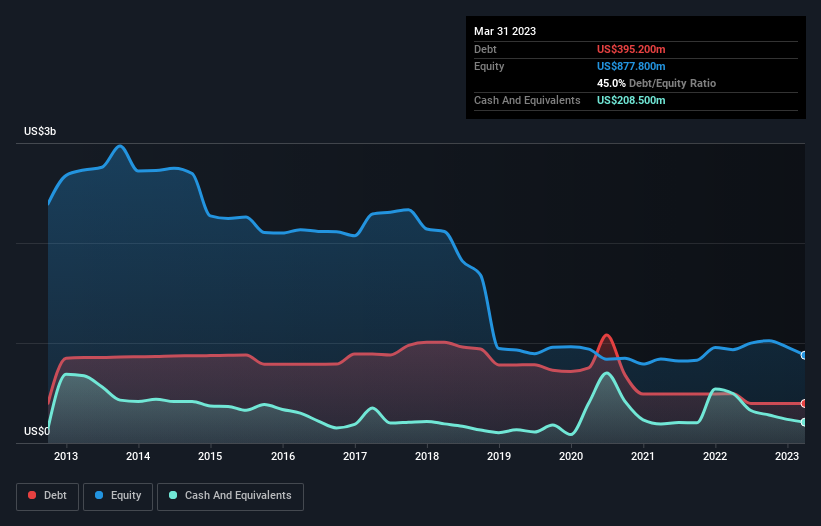
Legendary fund manager Li Lu (who Charlie Munger backed) once said, 'The biggest investment risk is not the volatility of prices, but whether you will suffer a permanent loss of capital.' It's only natural to consider a company's balance sheet when you examine how risky it is, since debt is often involved when a business collapses. We note that New Gold Inc. (TSE:NGD) does have debt on its balance sheet. But the real question is whether this debt is making the company risky.
Why Does Debt Bring Risk?
Debt and other liabilities become risky for a business when it cannot easily fulfill those obligations, either with free cash flow or by raising capital at an attractive price. Ultimately, if the company can't fulfill its legal obligations to repay debt, shareholders could walk away with nothing. However, a more usual (but still expensive) situation is where a company must dilute shareholders at a cheap share price simply to get debt under control. By replacing dilution, though, debt can be an extremely good tool for businesses that need capital to invest in growth at high rates of return. When we think about a company's use of debt, we first look at cash and debt together.
Check out our latest analysis for New Gold
What Is New Gold's Net Debt?
The image below, which you can click on for greater detail, shows that New Gold had debt of US$395.2m at the end of March 2023, a reduction from US$491.5m over a year. However, because it has a cash reserve of US$208.5m, its net debt is less, at about US$186.7m.

How Healthy Is New Gold's Balance Sheet?
Zooming in on the latest balance sheet data, we can see that New Gold had liabilities of US$157.5m due within 12 months and liabilities of US$1.19b due beyond that. Offsetting this, it had US$208.5m in cash and US$13.9m in receivables that were due within 12 months. So it has liabilities totalling US$1.13b more than its cash and near-term receivables, combined.
When you consider that this deficiency exceeds the company's US$811.7m market capitalization, you might well be inclined to review the balance sheet intently. In the scenario where the company had to clean up its balance sheet quickly, it seems likely shareholders would suffer extensive dilution. When analysing debt levels, the balance sheet is the obvious place to start. But it is future earnings, more than anything, that will determine New Gold's ability to maintain a healthy balance sheet going forward. So if you want to see what the professionals think, you might find this free report on analyst profit forecasts to be interesting.
Over 12 months, New Gold made a loss at the EBIT level, and saw its revenue drop to US$631m, which is a fall of 16%. We would much prefer see growth.
Caveat Emptor
Not only did New Gold's revenue slip over the last twelve months, but it also produced negative earnings before interest and tax (EBIT). Indeed, it lost US$16m at the EBIT level. Considering that alongside the liabilities mentioned above make us nervous about the company. It would need to improve its operations quickly for us to be interested in it. Not least because it had negative free cash flow of US$94m over the last twelve months. So suffice it to say we consider the stock to be risky. When I consider a company to be a bit risky, I think it is responsible to check out whether insiders have been reporting any share sales. Luckily, you can click here ito see our graphic depicting New Gold insider transactions.
At the end of the day, it's often better to focus on companies that are free from net debt. You can access our special list of such companies (all with a track record of profit growth). It's free.
Valuation is complex, but we're here to simplify it.
Discover if New Gold might be undervalued or overvalued with our detailed analysis, featuring fair value estimates, potential risks, dividends, insider trades, and its financial condition.
Access Free AnalysisHave feedback on this article? Concerned about the content? Get in touch with us directly. Alternatively, email editorial-team (at) simplywallst.com.
This article by Simply Wall St is general in nature. We provide commentary based on historical data and analyst forecasts only using an unbiased methodology and our articles are not intended to be financial advice. It does not constitute a recommendation to buy or sell any stock, and does not take account of your objectives, or your financial situation. We aim to bring you long-term focused analysis driven by fundamental data. Note that our analysis may not factor in the latest price-sensitive company announcements or qualitative material. Simply Wall St has no position in any stocks mentioned.
About TSX:NGD
New Gold
An intermediate gold mining company, engages in the development and operation of mineral properties in Canada.
High growth potential with excellent balance sheet.
Similar Companies
Market Insights
Community Narratives



